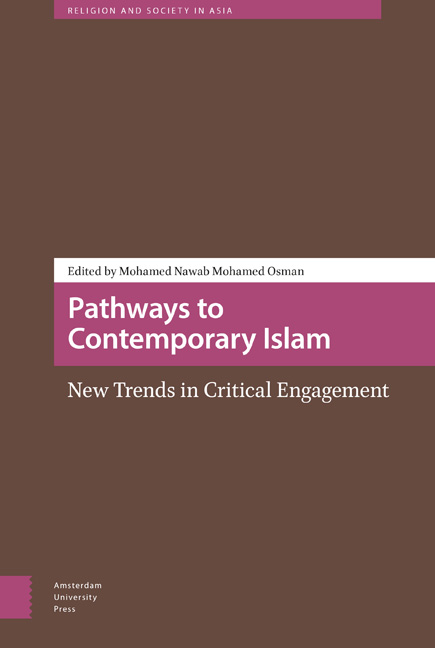Book contents
- Frontmatter
- Dedication
- Contents
- Acknowledgements
- Introduction: Constructing Pathways to Contemporary Islam
- Section 1 Historical Trends in Contemporary Perspective
- Section 2 Contesting the Islamic Intellectual Tradition
- Section 3 Beyond the Arab Revolutions: Political Islam Revised
- Section 4 Contemporary Spaces of Critical Engagement
- Notes on the Contributors
- Index
8 - Regaining the Islamic Centre?: A Malaysian Chronicle of Moderation and Its Discontents
Published online by Cambridge University Press: 25 November 2020
- Frontmatter
- Dedication
- Contents
- Acknowledgements
- Introduction: Constructing Pathways to Contemporary Islam
- Section 1 Historical Trends in Contemporary Perspective
- Section 2 Contesting the Islamic Intellectual Tradition
- Section 3 Beyond the Arab Revolutions: Political Islam Revised
- Section 4 Contemporary Spaces of Critical Engagement
- Notes on the Contributors
- Index
Summary
Abstract
This chapter chronicles factors contributing to and implications arising from declining levels of moderation in Muslim-majority societies in the era of global Islamic resurgence by looking at the example of Malaysia, a country that has been classified as a moderate Muslim country. Moderation here is understood in terms of both the intellectual conception of Islamic doctrine and its practical application as a way of life and of relating to others, both Muslim and non-Muslim. It is argued that moderation has taken a beating with the ascendancy of the Wahhabi-Salafi school of thought by especially penetrating Islamic institutions with organic linkages to the state, a phenomenon made worse by the prevalence of authoritarian structures and paternalistic political cultures in post-colonial Muslim societies. In Malaysia, Middle Eastern-influenced Salafization synergized with ethnocentric aspects of local politics to produce a socio-political environment largely antithetical to the country's pluralist heritage.
Keywords: Islamism; Moderation; Malaysia; Wahhabi-Salafi
Introduction
The past two decades has been a sad period for the ummah (global Muslim community). The sense of triumph at the Soviet Union's defeat in Afghanistan was quickly overtaken by the senseless violence that ensued among rival factions of the Afghan war. As if the travails endured in Bosnia Herzegovina were not enough, sectarian warfare was crippling Muslim-majority countries such as Sudan, Algeria, and Pakistan. By the late 1990s, violence had spread to the previously calm Southeast Asia, whose societies were well-known for their softer culture and greater religious accommodation with local customs vis-à-vis their Middle Eastern counterparts. The rapid spread of news through advancements in information and communication technology (ICT), particularly with the arrival of the Internet, meant that worldwide Muslim empathy with their suffering religious brethren was more swiftly and easily triggered. When Muslim terrorists were held liable for the airborne attacks on New York's World Trade Centre (WTC) and the Pentagon, United States of America (USA) on 11 September 2001, the stage was seemingly set for a battle between Islamic and Western civilizations as originally propounded by the Harvard academic Samuel Huntington. Among reasons cited by Huntington in his prognosis of a future ‘clash of civilizations’ were the shrinking of the world to become ‘a smaller place’ and the weakening of the nation state ‘as a source of identity’, the gap consequently filled mostly by religion, especially in its ‘fundamentalist’ forms.
- Type
- Chapter
- Information
- Pathways to Contemporary IslamNew Trends in Critical Engagement, pp. 181 - 212Publisher: Amsterdam University PressPrint publication year: 2020

